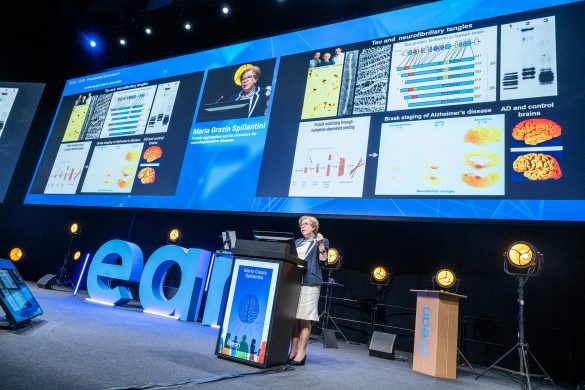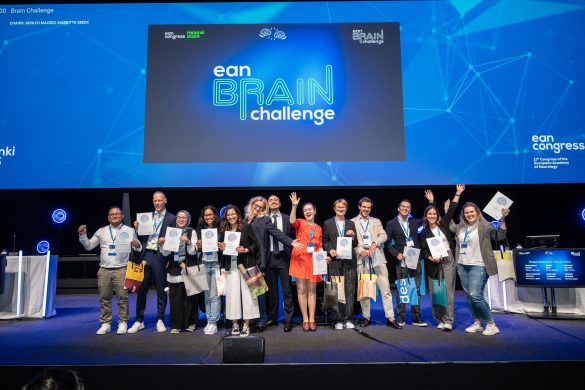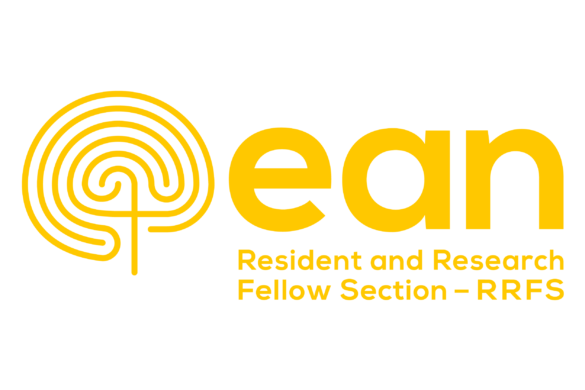by Viktoria Papp
Each month the EANpages editorial team reviews the scientific press for recently published papers of outstanding interest to neurologists. Below we present our selection for September 2023 (for our Paper of the Month for September, see here).
1. Cognitive outcomes at age 3 years in children with fetal exposure to antiseizure medications (MONEAD study) in the USA: a prospective, observational cohort study
The Maternal Outcomes and Neurodevelopmental Effects of Antiepileptic Drugs (MONEAD) study is a prospective, observational, multicentre cohort study investigating the effect of epilepsy and anti-epileptic drugs on the foetus by measuring neuropsychological parameters at the age of three years. Among the 456 pregnant women (351 with epilepsy and 105 without epilepsy) enrolled in the study, 345 children were born to women with epilepsy and 106 children were born to women without epilepsy. The main findings of this study were: (1) cognitive outcomes in children did not differ if the mother had epilepsy or not; (2) no difference was found in cognitive outcomes after exposure to currently commonly used antiepileptic drugs compared to older antiseizure medications like valproate; (3) exposure-dependent effects were observed for multiple measures, particularly for levetiracetam; (4) post-partum anxiety in mothers both with or without epilepsy had a negative impact on the children’s cognitive outcomes.
2. Donanemab in Early Symptomatic Alzheimer Disease: The TRAILBLAZER-ALZ 2 Randomized Clinical Trial.
This multicentre, randomised, double-blind, placebo-controlled, 18-month phase 3 trial evaluated the effect and side effects of donanemab in early symptomatic Alzheimer’s disease. Donanemab, a monoclonal antibody against insoluble, modified β-amyloid present only in the brain, supports the removal of amyloid via microglial-mediated phagocytosis. The 1736 eligible participants were randomised (1:1) to donanemab (n = 860) or placebo (n = 876) intravenously every four weeks for 72 weeks. The primary outcome was an integrated assessment of cognition, daily function, and global disease severity (iADRS score). Further outcomes included several biomarkers (imaging, laboratory test). The results showed that in participants with early symptomatic Alzheimer’s disease, donanemab significantly slowed clinical progression at 76 weeks. Severe adverse effects occurred in 17.4% of the donanemab group and 15.8% in the placebo group. Risk of serious amyloid-related imaging abnormalities in the treatment group was observed, which in three cases was fatal, indicating the need for further evaluations to identify the best approaches for managing risks and maximising benefits.
3. Safety and clinical activity of autologous RNA chimeric antigen receptor T-cell therapy in myasthenia gravis (MG-001): a prospective, multicentre, open-label, non-randomised phase 1b/2a study
This prospective, multicentre, open-label, phase 1b/2a study is the first study testing a newly engineered chimeric antigen receptor (CAR) T cell therapy based on RNA (Descartes-08) to reduce potential toxicity known from the conventional CAR-T therapy in autoimmune diseases. Fourteen patients with generalised myasthenia gravis (MG) were included in the study. The phase 1b study part included patients with MG class III-IV treated with an increasing dose of Descartes-08 to identify the maximum tolerated dose. In the phase 2a study part, participants with MG class II–IV were treated with six doses of the maximum tolerated. The primary outcomes were to assess the safety and tolerability of Descartes-08, while secondary outcomes were to evaluate the severity of MG and biomarkers in participants treated with Descartes-08 in an outpatient setting. No dose-limiting toxicity, cytokine release syndrome, neurotoxicity or functional immunosuppression were reported. The most frequent side effects were headache, nausea, and fever. Clinical improvement was shown from baseline to week 12 indicated by Myasthenia Gravis Activities of Daily Living score (–6 [95% CI: –9 to –3]), Quantitative Myasthenia Gravis score (–7 [95% CI:–11 to –3]), Myasthenia Gravis Composite score ( –14 [95% CI:–19 to –9]) and Myasthenia Gravis Quality of Life 15-revised score (–9 [95% CI: –15 to –3]). The study showed promising results suggesting a new potential treatment for patients with myasthenia gravis and other autoimmune diseases.
4. Atogepant for the preventive treatment of chronic migraine (PROGRESS): a randomised, double-blind, placebo-controlled, phase 3 trial
This phase 3, multicentre, randomised, double-blind, placebo-controlled, parallel-group trial assessed the efficacy, safety, and tolerability of atogepant as a preventive treatment of chronic migraine. Atogepant is an oral high-affinity gepant acting as a CGRP receptor antagonist and was previously tested in episodic migraine. The eligible 778 adult patients with chronic migraine with a minimum one-year disease duration were randomised (1:1:1) to oral atogepant 30mg twice a day, oral atogepant 60mg once a day, or placebo. The primary outcome was the change from baseline in mean monthly migraine days (MMD) after 12 weeks of treatment. Significant differences in the change from baseline in mean MMDs between placebo and the treatment groups were found (mean difference from placebo was −2.4 with atogepant 30mg 2/daily (95% CI −3.5 to −1.3; adjusted p<0,0001) and −1.8 with atogepant 60mg 1/daily (−2.9 to −0.8; adjusted p=0,0009). The improvement in mean MMDs from baseline was −7.5 (SE 0.4) for atogepant 30mg 2/daily, −6.9 (0.4) for atogepant 60mg 1/daily, and −5.1 (0.4) for placebo. No severe adverse effect was observed. The most frequently reported adverse effect was constipation (30mg 2/daily 28 [10.9%]; 60mg 1/daily 26 [10%]; and placebo 8 [3%]). This is the first study showing evidence of oral CGRP receptor antagonists as a well-tolerated preventive treatment for chronic migraine.













